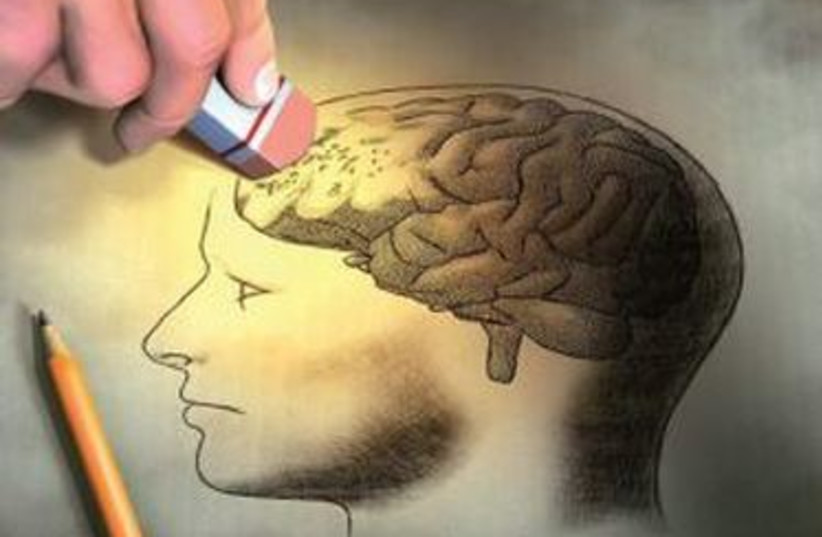How to care for an aging parent: Lessons from my mother - opinion
Those of us being entreated to care for the elderly understand precious little of life as they experience it.

I’ve long been aware of my inadequacies as a parent; for that I have my children to thank. My inadequacies as a child are a more recent discovery, courtesy of my 99-year-old mother.
But I’ve gotten ahead of myself. First some Yiddish wisdom: Escaping a storm, a bird began flying her four babies across the ocean. “When I am old, will you do the same for me?” she asked the first.
“Of course,” answered the nestling. “It will be my honor.”
“Liar,” said the mother, and dropped the baby into the waves below. The same with the second and third.
The fourth replied otherwise. “No, Mother,” he said regretfully, “then I will have children of my own, and I shall be caring for them. I won’t be able to care for you as well.

It’s unlikely my mother’s ever heard that parable, yet she’s managed to capture its essence in a single sentence: “How can it be that one mother can take care of four children, but four children can’t take care of one mother?”
We do, of course, my three sisters and I, but in my inability to respond to her indictment in a way that would help her understand the lengths we go to in caring for her and ameliorate her despondency at the onset of dementia, I realize I’ve received no preparation whatsoever to deal with the aging of a loved one.
This is a realization that triggers some serious soul-searching as we approach Yom Kippur and the prayerful recitation of the verse “Cast me not off in my old age; forsake me not as my strength fails.”
In the process, the answer to my mother’s question comes to me: Those of us being entreated to care for the elderly understand precious little of life as they experience it.
How can we be expected to respond to their needs unaware of them? And until such time as we are, it will be all but impossible to fulfill the commandment to honor our parents – to carry them across the ocean, so to speak.
IN MY imperfect effort to do that, I traversed the ocean 10 times during the last two years to spend time with my mother. Reflecting on those visits, I recognize that she has continued to impart life’s lessons to me, even in her decline.
As none of us are getting any younger, but more of us are living longer, I thought others might find what I’ve learned useful as well. Our tradition is clear regarding the sanctity of revering the aged. Midrash Vayikra Rabbah 9:3: “The respect one gives to the elderly is akin to showing reverence for God.”
Less clear is how we go about manifesting that respect, particularly when the individual is, well, let’s say “less present.”
Lessons on how to care for an aging parent
I share here, then, what I’ve glimpsed of the world my mother inhabits, formulated as a Living Will of sorts – not a set of directives for how to let me die but a manual letting others know how I think I’d like to live should I end up hanging around long enough to need their care.- Above all else, do not infantilize me.
- Understand my state of mind.
My friends are gone. At least I think they are. Honestly, I don’t know who’s alive anymore and who isn’t. I can’t even remember their names.
Books? A string of words I have trouble making sense of.
Movies and television? The pictures move too fast. All you can do is provide me with fleeting moments of happiness.
A kind word, a gentle caress, a game of Scrabble in which I am permitted to make up my own rules as we play.
- Don’t ask me if I remember.
I’m confused and disoriented, frightened of what will be, and ashamed of what I’ve become. You say it’s not my fault, but I can’t help believing it is.
Sometimes I pretend to remember something to hide my embarrassment, but I’m really all mixed up – even about who my children are and how many I have. Pictures. Maybe pictures will help. Try showing them to me – unless and until they cause more anxiety than pleasure. Trying to jog a memory that doesn’t exist only creates stress.
- Don’t correct me.
So, if you call me every day and I insist you never do, try to set the record straight. I’d rather know I’m forgetful than think I’m unloved. But otherwise, please don’t confuse me with the facts; it’s only likely to trigger rage.
- Answer my questions as though it’s the first time I’ve asked.
- For your sake and mine, promise to remember that the real me is the one who showered you with a lifetime of love, not the dybbuk showering you with undeserved abuse who infested me only recently.
- Dementia is a brutal disease. It’s not only about memory loss and confusion. It’s also about transforming personalities and often results in cruel and aggressive behavior. I might not be able to protect you from that, but I want you to know that the real me would never say those hurtful things. In balancing your care for me with meeting your own needs and those of your family, I insist you err in favor of the latter. And don’t feel guilty over not sacrificing your happiness for mine. That is nothing I would ever want you to do.
The writer is currently engaged in establishing the Navon Center for a Shared Society. He has served as deputy chair of the Jewish Agency and World Zionist Organization and was the founding director of the Herzl Museum and Educational Center. More importantly, he loves, honors, and reveres his mother.






